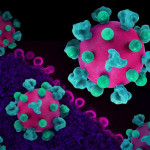Seeking to discern why weight gain is so common after people with HIV start taking an antiretroviral (ARV) in the integrase inhibitor class, researchers have begun to identify genetic factors that might influence a rise in body mass index (BMI), aidsmap reports.
A number of investigators presented findings from studies on weight gain related to integrase inhibitors at the 2020 Conference on Retroviruses and Opportunistic Infections in Boston last month.
Jacqueline Capeau, MD, PhD, of Sorbonne University in Paris, provided an overview of what scientists have learned thus far about weight gain risk factors for people with HIV after starting an ARV regimen.
Among those starting their first HIV treatment regimen, weight gain risk factors include having a low CD4 count, a high viral load and a low BMI. Within the integrase inhibitor class, dolutegravir (sold under the brand name Tivicay and included in the Dovato, Juluca and Triumeq combination-tablet regimens) and bictegravir (included only in the Biktarvy combination-tablet regimen) are more strongly linked to weight gain than other drugs in the class.
The newer form of tenofovir, tenofovir alafenamide (TAF, included in the HIV combination tablets Descovy, Biktarvy, Genvoya, Odefsey and Symtuza) is linked to weight gain. The older form of tenofovir, tenofovir disoproxil fumarate (TDF, sold individually as Viread and included in the combination tablets Truvada, Atripla, Complera, Stribild, Delstrigo, Symfi, Symfi Lo, Cimduo and Temixys) and efavirenz (included in Atripla and the two Symfi tablets) each protect against weight gain. Women and African Americans are more inclined to gain weight on ARVs compared with men and other races.
Allison Ross Eckard, MD, of the Medical University of South Carolina in Charleston, presented findings from a study of 30 people with HIV starting ARVs for the first time. Twenty-eight of them started an integrase inhibitor, including 16 who took dolutegravir; 12 people took TAF. During their first year on ARVs, the participants gained 35 pounds on average, half of which was fat. This occurred despite the fact that the participants experienced no shift in their resting metabolic rate or number of calories or oxygen consumed.
Eckard and her colleagues concluded that starting ARVs had not increased the participants’ appetites, changed their eating habits or influenced their metabolisms. Participants’ metabolic rate before they started treatment was associated with a gain in body fat.
A group of Japanese researchers studied 220 people taking an integrase inhibitor and 62 people taking a protease inhibitor as a part of their first ARV regimen. They looked specifically at a genetic variation called the GG polymorphism in the RETN-420C>G gene, which drives insulin sensitivity in peripheral tissues and the central nervous system.
The investigators found that six months into treatment, individuals with the GG polymorphism gained more weight than those with two other variants of the gene in question but that this difference occurred only for those taking integrase inhibitors, not for those taking protease inhibitors.
Another study, called ADVANCE, found that a variation in the gene that determines the speed at which the body metabolizes efavirenz was tied to the degree of weight gain among people taking that ARV. The investigators found that people who were genetically inclined to metabolize efavirenz more slowly, thus leaving them with higher levels of the drug in the body, tended to gain less weight.
To read the aidsmap article, click here.
To read the Eckhard study, click here.
To read the conference abstract about efavirenz metabolism, click here.







Comments
Comments